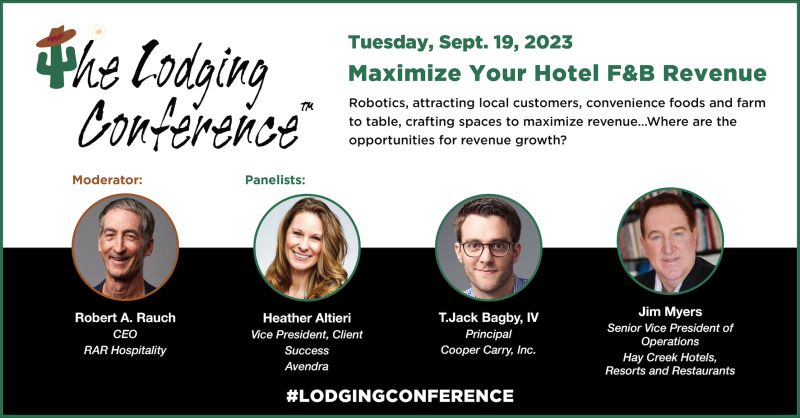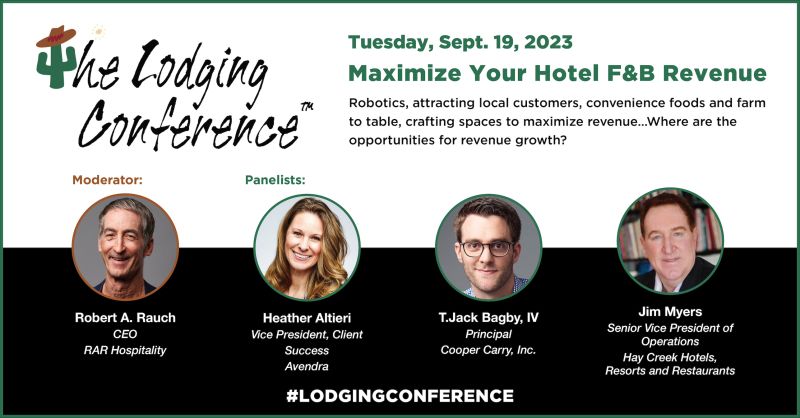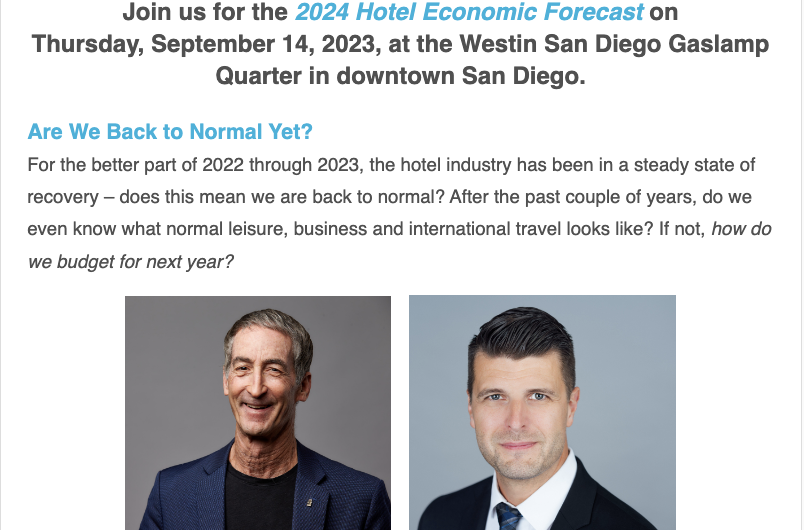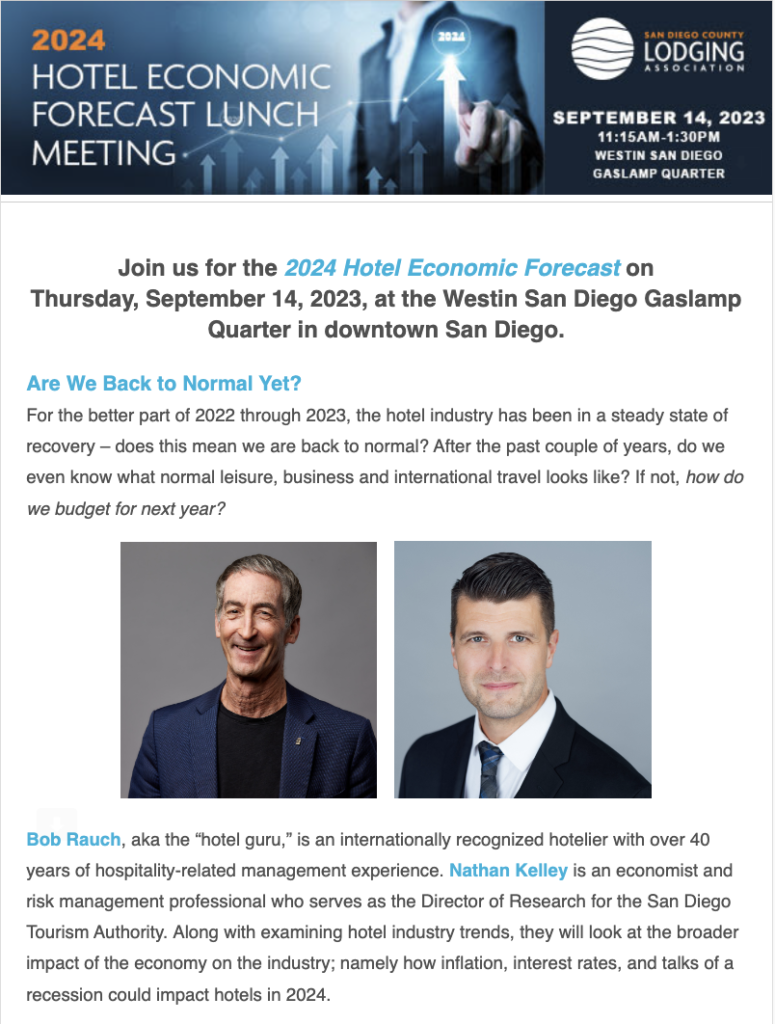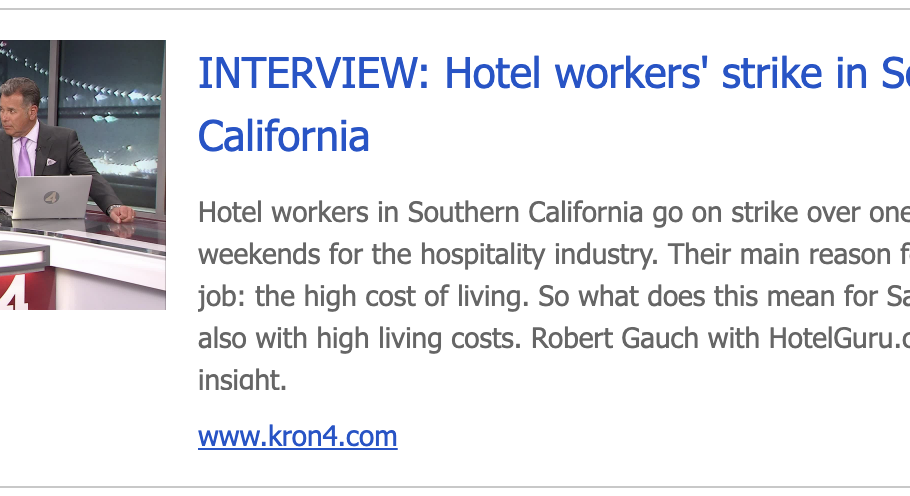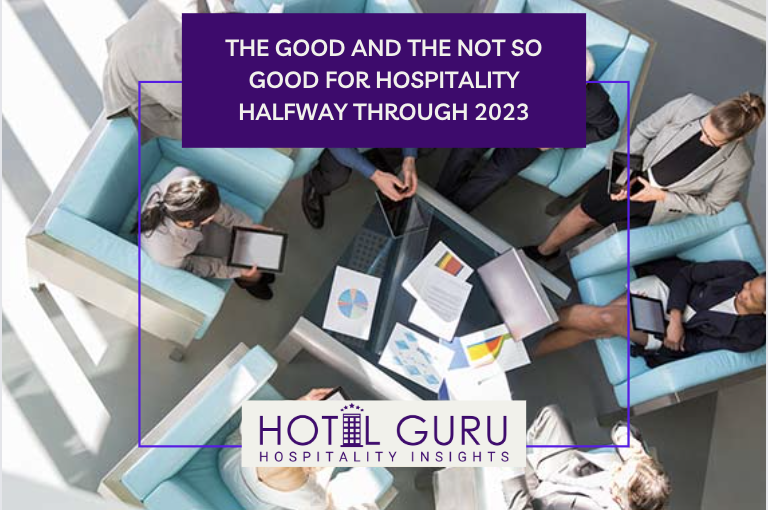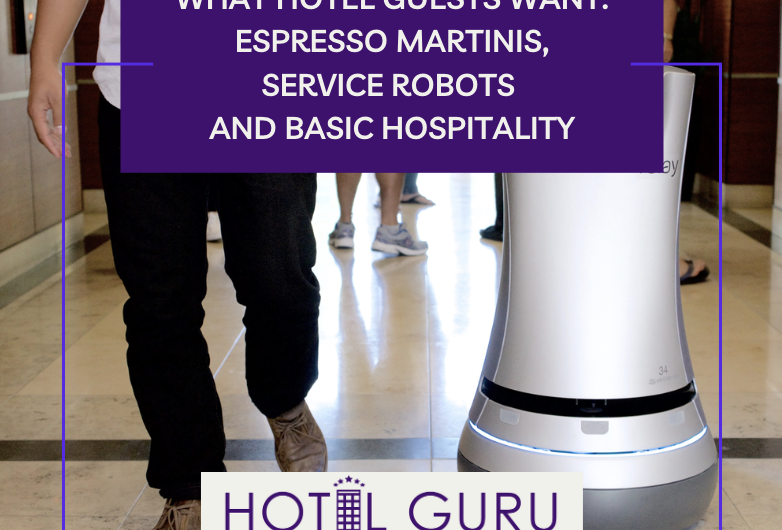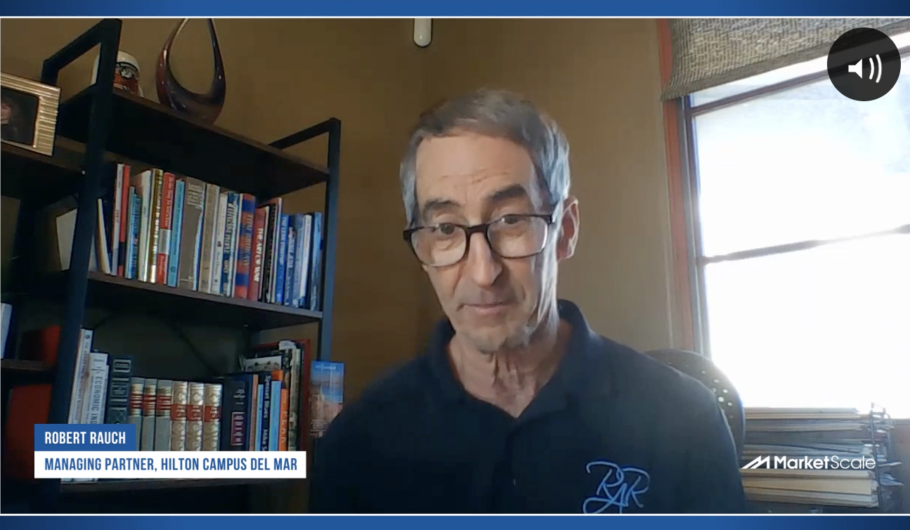The Power of Empathy and Personalized Service
Empowering Staff To Build Rapport With Guests Will Elevate Hospitality
By Robert Rauch
HNN columnist – Original article can be found here
July 12, 2023 | 5:25 AM
As the great civil rights activist Maya Angelou once said: “People will forget what you do; they’ll forget what you said, but they’ll never forget how you made them feel.”
This sentiment holds true in the hospitality industry, where we have the privilege of joining people as they celebrate the most joyous moments in their lives. However, it is equally important to offer moments of consolation and support during their most challenging times.
Hospitality is a noble profession, and our work truly matters. After the unprecedented lockdowns of 2020 and 2021, it is time to regroup and establish a new normal. While the pandemic imposed a temporary disruption to how we work, we must now reassess and redefine what the future of hospitality should be.
In this pursuit, we find ourselves reassessing the treatment of employees.
In the pre-lockdown era, we may have been strict with employees who were late, but now it is time to extend charitable assumptions, such as asking, “You’re late, is everything okay?” There are two reasons behind this approach. Firstly, the power dynamics have shifted, and employees now hold an advantage in the supply/demand spectrum. Secondly, it is simply the right way to treat our most valuable assets — our employees.
Applying the concept of charitable assumptions also extends to guests who exhibit poor behavior. During the lockdowns, many of us witnessed a decline in guest behavior, which we could attribute to various factors such as personal issues or the accumulated stress from disrupted lives. As travel resumes and guest behavior appears to return to normal, it is essential to give them the benefit of the doubt when isolated incidents occur.
One aspect of our approach is to engage with our guests relentlessly during breakfast, every single morning, seven days a week. Our general managers and top management team personally interact with guests, fostering a warm and welcoming atmosphere. We take the time to connect with families and ask children dining with their parents, “Where are your folks taking you today?”
These interactions not only help build a fantastic rapport but also provide insights into our guests’ experiences. Meeting the general manager of a hotel is an uncommon occurrence for guests, and this personalized engagement significantly improves our guest satisfaction scores. Ultimately, at a hotel, nothing surpasses the importance of personalized service.
In addition to personalized interactions, incorporating innovative technology solutions can further enhance the guest experience. From mobile check-ins to customized room preferences, technology can streamline processes and provide tailored experiences for each guest. By leveraging data and guest preferences, we can anticipate their needs and deliver personalized services that go above and beyond their expectations.
Furthermore, investing in employee training and development is crucial for delivering exceptional personalized service. By providing ongoing training programs, we empower our employees with the necessary skills and knowledge to deliver outstanding experiences. This includes not only technical training but also emphasizing the importance of empathy, active listening and problem-solving. When employees feel valued and equipped to provide personalized service, they are more likely to go the extra mile for our guests.
In summary, the power of personalized service extends to both our guests and employees. By adopting charitable assumptions, engaging with guests on a personal level, leveraging innovative technology, and investing in employee training, we can create a hospitality experience that leaves a lasting impact.
By delivering exceptional personalized service, we can create lasting memories and elevate the hospitality experience for all. Let us embrace the importance of personalized service as we forge ahead into the future, setting new standards and exceeding expectations in the ever-evolving landscape of the hospitality industry. Let us relish the summer of a recovered tourism industry and conclude the year with a sense of hope.
Robert A. Rauch is founder of R.A. Rauch & Associates, a hospitality management and consulting firm based in San Diego.
The Good and the Not So Good for Hospitality Halfway Through 2023
Hotel Demand Will Continue To Accelerate
By Robert Rauch
Original Article on HNN can be found HERE
At the beginning of this decade, the lodging industry experienced a significant recession triggered by the lockdown measures implemented in March 2020.
These measures resulted in the closure of attractions, numerous hotels, and a virtual halt to travel in the United States and abroad. Now, let’s examine how the post-lockdown environment is affecting the economy.
Unemployment rates have significantly decreased and currently stand at approximately 3.5%. Additionally, the banking crisis that caused market concerns early in the second quarter of 2023 seems to be contained or under control. According to CBRE, the forecast for the gross domestic product indicates it will remain around 1.5% for the remainder of this year and throughout 2024.
Inflation, as measured by the Consumer Price Index, has been consistently higher than the long-term average of 2.8% for the past three years. This inflationary pressure has resulted in a 24% increase in wage rates over the same three-year period. While average hotel rates have experienced significant growth, reaching the high teens at 18% or more, the real revenue per available room has not yet kept pace with the rate of inflation.
The Good News
Demand will accelerate for several reasons. First, leisure business continues to do well, corporate and groups are growing toward 2019 levels, and international travel is just beginning to come back. Average rates are up in all sectors: leisure, corporate negotiated and group. We do not see rate resistance yet, and all signals are good for RevPAR acceleration. Consumer confidence is up for the seventh straight month and Google search travel trends are back at 2019 levels. International travel is coming back with the restrictions easing, even in Japan and China.
Not as Good
We don’t see much movement in occupancy going forward. It doesn’t benefit us to take any more business; we are better off charging more as demand accelerates in the third quarter. Finding a good labor force, especially in housekeeping, continues to be a work in progress. Training new hires is tougher now than ever before as management teams are new due to the impact of the lockdown. These managers are training supervisors who have never managed others before as they were promoted from line positions recently. It is almost like the blind leading the blind, which creates opportunities for daily mistakes, apologies to guests, refunds or discounts and organized chaos.
Not So Good
While travel is a birthright in the mind of most Americans, inflation, interest rates and construction costs are certainly headwinds. Costs of food, energy, insurance and labor are at all-time highs with no sign of slowing. These costs are up an average of 10% over last year, and those costs were up over 10% over 2021.
Interest rates are making it difficult to refinance. If there is good news here, it is that no new supply will be the mantra as getting a construction loan now is as difficult as it has been in years. This is partly due to interest rates as well as the collapse of Silicon Valley Bank, Signature Bank and a few others. So, it is good news for operators, bad news for those trying to break ground.
Office occupancy rates are at historic lows, and that continues to be a headwind for corporate demand. Housing and mortgage prices are up, and wages are up 24% in the past three years. The second quarter is softer, but we continue to see an improved market in all sectors of lodging.
Bank Debt
Banks’ appetite for hotel financing is much less than back in 2019. Construction loans are at 8%-plus. and existing hotel acquisitions are being financed at closer to 7%. The landscape is better suited for conversions since that involves an asset with stable cash flow. There is private equity out there, and while it is not cheap, it offers slightly better leverage than the 50% to 55% that a bank will fund. Banks still prefer to finance projects for major brands such as Hilton, Marriott and IHG, because of their robust reservations and awards systems, but there is still interest in financing independent hotels in more urban areas.
Forecast
Air, hotel, online travel agencies, cruise lines and short-term rentals are all finally above 2019. April had some budget misses, leisure is flat, group and corporate are still coming back and RevPAR should be up over 5% both in 2023 and 2024. Naturally, every macro and micro market is different. In San Diego, we work closely with the San Diego Tourism Authority and the San Diego County Lodging Association to produce an annual detailed submarket forecast. We have also worked with Visit Phoenix to produce similar works in conjunction with the Phoenix Area Revenue Managers.
Stay focused — all will be good through the 2024 elections for now!
Robert A. Rauch is founder of R.A. Rauch & Associates, a hospitality management and consulting firm based in San Diego.
Time for Hoteliers To Reevaluate Competitive Advantage
Strategies for Maximizing Hotel Marketing, Technology and Finance
By Robert Rauch
Original article published on CoStar can be found here
May 30, 2023 | 6:15 AM
The classic model of competitive advantage is Michael Porter’s “Five Forces.” According to Porter, “the existence of products outside of the realm of the common product boundaries increases the propensity of customers to switch to alternatives.”
Because of the pandemic and the lack of new supply over the past few years, the hotel industry has been somewhat immune to new competitors. Airbnb, Vrbo and other short-term rentals are competitors for tourist dollars as well as soft brands, the ones that brands added so that they could both boost revenue streams and compete with these short-term rentals.
As we see it, short-term rentals and soft brands are a new reality that hoteliers are still grasping to embrace. Is Airbnb a complement to hotels or is it a threat to the traditional hotel model? Are soft brands a great way for hoteliers to have some design flexibility and still have the horsepower of a brand? Or is it just another competitor adding to supply?
Given the penchant of millennials and Gen Z travelers to chart their own paths and their increasing share of the traveling public, expect to see Airbnb and other “short-term rental” players continue to dominate the conversation and hoteliers continuing to focus on gaining a competitive advantage. Additionally, the brands are updating their legacy brands to make them more competitive — yes, at the expense of the owners, but the products look good!
Technology as a Competitive Advantage
Competitive advantage consists of two components. The first is the distance between our hotel offerings and our nearest competitors — or the competitive advantage gap. The second is competitive advantage period (CAP). In other words, if a hotel company has superior products and significant barriers to entry, it has both a competitive gap (product differentiation) and a competitive cap (time lag for competitor entry).
What immediate and practical steps can we utilize to optimize our competitive advantage? We can reevaluate our distribution processes, promotions and channels as well as adding robotics and guest-serving communications technology. The large amount of demographic and psychographic information available about the makeup of today’s traveler requires analytical skills and creativity to correctly respond to the marketplace.
When direct bookings result in repeat business, costs are reduced rather dramatically and owners are happy.
Many hotels do not have qualified staff to develop these direct bookings — so which is better? Paying an online travel agency or developing a team? For a quick fix, opt for the OTAs. For the long haul, we must work on our teams to increase our profits and use OTAs to complement our direct bookings to obtain a healthy mix of business.
Pay-Per-Click Strategy
We can refresh our pay-per-click strategy by doing more than just bidding on keywords that persuade people to click our ads. We can tailor keyword combinations to clearly outline the benefits of booking direct, and include direct links to the specific rates displayed.
Cleaning up our phrasing and clarifying benefits by experimenting with different verbiage is critical. Ensuring that changes are made as needed will help amplify our profile for guests looking to book. Other social strategies can be employed by our digital team to enhance results.
Finance
Today, credit is tightening at a time when there is a significant amount of hotel loan maturities on the short-term horizon. Almost $400 billion of bank commercial real estate loans are maturing in 2023. Meanwhile, limited access to capital and higher interest rates have already begun to negatively affect property valuations. This will stress the takeout on these upcoming maturities. Those who are prepared to refinance in advance of these maturity dates will have a major competitive advantage as they will not need to increase their rates materially in the event of a recession.
Summary
Competitive advantages that are guest-facing must be made known to potential guests. If we think this way with all facets of travelers — group, corporate, leisure and international — we can optimize performance. If we also have our finances in order, we will be in a position to own our future without stress.
Robert A. Rauch is founder of R.A. Rauch & Associates, a hospitality management and consulting firm based in San Diego.
It’s Time To Induct the Next Class of Hotel Industry Icons Into the Hall of Honor
Conrad Hilton School in Houston Has Led the Effort in the Past
By Robert Rauch
HNN columnist – This article can also be found here
Most industries have some kind of Hall of Fame or in the case of the hospitality industry, a Hall of Honor.
Such is the case in both many states individually and at the Conrad Hilton School in Houston. Each year, from the inception in 1996 of the Hall of Honor through 2016, industry leaders were recognized. These included J. W. Marriott, Conrad N. Hilton, Ray Kroc, Ernest and Julio Gallo and Walt Disney to name a few.
The Hall of Honor Gallery is located off the main lobby of the Hilton University of Houston and features specially commissioned portraits of each inductee by artist Robert Lapsley. According to the college, “personal papers, memorabilia and corporate histories are archived and displayed in the Massad Family Library Research Center and Hospitality Industry Archives at Hilton College.” This memorialized the inductees’ achievements and leadership and provided an appropriate tribute to the companies they conceived and built during their lifetimes.
According to the archives, “on September 25, 1996, Conrad N. Hilton, J. Willard Marriott, Vernon Stouffer and Kemmons Wilson became the first honorees inducted into the newly established Hall of Honor at a gala ceremony attended by more than 350 people.
Today, we are seven years removed from the last induction. It is difficult to keep up with a concept like this — after all, it is not like baseball, where millions of fans know their players for years. This is an industry with millions of employees but someone needs to keep up with who the players are that make this industry tick. Since that original induction ceremony, there are myriad industry leaders who were inducted, some of whom are still active in our industry. They include Chris Nassetta, Jack DeBoer, Randy and Carolyn Smith, Steve Rushmore, Stephen Bollenbach, Mike Leven, John Q. Hammons and 50 or so more.
Each year, we lose industry icons that pass away after 50 to 60 years of service to our industry. Two that we lost last month include Howard Feiertag and Bruce Baltin. Even though I never worked directly with Howard, I looked to him as my idol and mentor. He once offered me a job but I didn’t want to relocate to Florida from Arizona. My wife is happy that I didn’t move because we never would have met! Howard was not only a great hotel marketer, speaker and author but also a great hospitality educator and a mensch. Bruce Baltin was arguably one of the greatest hospitality consultants ever to serve our industry. If I ever wanted advice on a hotel project, I knew that he was as good as anyone at answering the question. He was also a great leader who gave of his time for students, clients and colleagues.
There are many since 2016 who I would have liked to see honored in this Hall of Honor. Peter Yesawich is one, Arne Sorenson another and many of you out there know some superstars who someday should be honored. Think in terms of hoteliers Mit Shah, Mitch Patel and other entrepreneurs. There are some great tourism industry CEOs, media including the late Jerry Merkin and consultants such as Suzanne Mellen and Karen Rubin. Additionally, lawyers — Jim Butler, as an example — have pioneered hotel law.
There are many others who should be considered. I am writing this to try to stimulate new life into either the Conrad Hilton program or a new way to honor our top contributors. I could think of no better place than to have this appear in CoStar’s Hotel News Now. Maybe some great idea will fill the void before more industry icons pass away.
Robert A. Rauch is founder of R.A. Rauch & Associates, a hospitality management and consulting firm based in San Diego.
What Hotel Guests Want: Espresso Martinis, Service Robots and Basic Hospitality
Tips for Boosting Guest Satisfaction Scores
By Robert Rauch
HNN columnist / Original article can be found on CoStar.com
What does it take to make guests happy?
We all know that if guests are not happy, they do not return. Ergo, if guest reviews are critical, and they are, how do we optimize the guest experience?
While this article will not touch on every facet of the hotel industry and will not cover every type of guest experience, consider it my primer on ensuring guests are excited about our properties — even if we have a focused-service hotel with limited guest amenities.
Food and Beverage
The “new normal” of food and beverage began before the pandemic with the elimination of room service by many hotels. Now, guests are more interested in high-quality food and beverage than they are in being pampered — except at the five-star level.
Smaller menu offerings, reduced hours and picking food up versus having it delivered are all fine, so long as quality is there. Good, consistent food service coupled with unique beverage service will be appreciated.
If you do not have a restaurant, all you need is a staff that can recommend great food and beverage experiences. If you have a restaurant and bar, a great cocktail menu that includes espresso martinis, great local wines, craft beers and mocktails will be a hit! Couple that with a staff that is friendly, well-trained in the basics and reasonable prices and profits can actually be made!
Wellness Is Top of Mind
As we transition from food and beverage to wellness, one key area is a healthy balance of food offerings to include both the “meat and potatoes” of the world and the “lean, veggie” diet. Guests who are conscious of wellness will want vegetarian, vegan and gluten-free options for food.
The wellness travel market is now approaching a trillion-dollar industry according to the Global Wellness Institute. Guests want stress reduction, accessible exercise options and healthy snacks and meals. Yoga is now mainstream and mindfulness is a growing self-care practice. The latest fitness equipment in the gym, opportunities, on-site or off-site for fitness classes and information that makes staying healthy on the road will benefit the traveler and create happier guests.
Technology Extras That Impress
Robotics is not a new concept, but it is now hitting mainstream in hotels. A service robot can deliver food, beverages, sundries and housekeeping supplies, and these bots are loved by guests and team members alike. A service bot can monitor the Wi-Fi system and provide additional security through its camera and by allowing a night auditor to stay at the desk late at night to early in the morning. A vacuuming robot can do the room flooring while a housekeeper cleans the bathroom — this is both productive and reduces workers’ compensation claims due to back strain from vacuuming. These robots can be manufactured in bulk now, so pricing is coming down.
Back to Basics
Today’s guests are not that different; however, we just came out of a true pandemic, one that changed mindsets about life in general and also reinvigorated the “travel as a birthright” lifestyle. According to a fall 2022 study by HospitalityTech.com, free Wi-Fi is still No. 1 on the guest wants list. Positive reviews are a close second and the ability to use their mobile device for reservations is third, tied with text communications with the hotel before the guest stay. A friendly, knowledgeable and well-trained staff can make a guest feel comfortable from the very first touch and through their stay. Guests want a friction-free stay, and if we can add great food and beverage, nice touches in our guest rooms and the ability to live like we do at home — think smart TVs — we will score very high on reviews.
Robert A. Rauch is founder of R.A. Rauch & Associates, a hospitality management and consulting firm based in San Diego.
Why Hotels Should Learn to Love Robot Technology
CLICK HERE TO WATCH FULL VIDEO
The guest experience is getting upgraded at many hotels today thanks to innovative robot technology.
Aloft Hotels first introduced the world’s first robotic concierge in the early 2000s, and in 2014, they brought Botlr, a robot butler service, to the team. These AI enhancements increased the guest experience through shorter wait times for room deliveries and improved housekeeping operations efficiency. Aloft may have led the way, but other hotel chains are quickly catching on to the advantages of robotic services.
Some challenges could offset these advantages due to the costs of implementing and maintaining the robotic infrastructure and a lack of industry-wide standards for hotel robots. Still, the increasing need to provide services with a lack of available workers means hotels will likely continue to look towards robotics to find solutions. Experts predict the global market for hotel robots will grow to $338 million by 2025.
Robert Rauch, hotel entrepreneur, Managing Partner, Hilton Campus Del Mar, faculty associate at the School of Community Resources & Development at Arizona State University, and CEO of RAR Hospitality, see the efficiency benefits of bringing robotics to both front- and back-of-house hotel operations as multi-layered. Beyond that, though, Rauch sees the investment as a smart move for increasing hotel profit margins.
Robert’s Thoughts
“I’ve got to tell you, robotics is the future. We have two types of robots. One is a service robot, the other is a vacuuming robot. So the service robot we’ve had for six years now, and I can tell you the guests see the service robot at the front desk. By the time they’re up in their room asking for either food, beverage, or supplies, they ask for the robot.
Now, is it because they don’t have to leave a tip? No. Really, they are just wowed by interacting with the robot. So what else does the robot do? If you have an 11:00 PM to 7:00 AM shift where you have one employee in the hotel, because it’s a limited service hotel, you’ve got better security because the delivery’s made by the robot. Also, you’ll be able to tell if the WiFi system is not working because it works on the WiFi system, so it’ll tell you if there’s a problem, and it also has a camera and sees any security issue in the hotel. So, highly recommend getting a service robot.
Relative to vacuuming robots, while we’ve only had them for about six or seven months now, I can tell you that it reduces pressure on the housekeeper’s backs and also creates a productive environment where the housekeeper’s cleaning the bathroom while the robot is vacuuming the floor in the bedroom. So, why get involved? Great PR, your guests will love it, your employees will love it, and it’ll help your productivity.”





